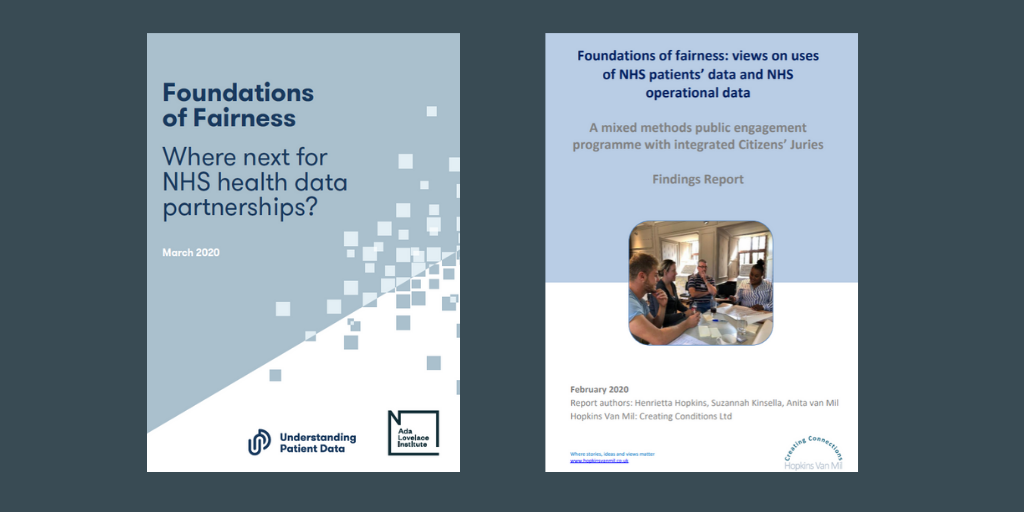Understanding Patient Data commissioned research to find out what the public believes makes a makes a fair health data partnership between the NHS, and researchers, charities and industry.
About the research
We took a mixed-methods deliberative approach to the project. This included discussions with patient advocacy groups, three citizens’ juries and a nationally representative survey of over 2,000 people. The research looks at data from patient records and operational data collected through the running of the health system.
The findings were published in early March 2020, before the covid-19 pandemic had reached its peak in the UK. The pandemic has raised new challenges and questions, but much of what we learned is now even more important considering how data has been used to manage the public health response.

Key findings
1. All partnerships between the NHS and third parties that include access to data held by the NHS, must aim to improve health and care for everyone. Improvements to health must be prioritised over financial incentives and distributed across the country, to prevent making health inequalities worse.
2. NHS bodies need support and guidance to negotiate fair terms for agreements with third parties. The public is concerned the NHS will be exploited by private companies. A single point of guidance and oversight should be established to set consistent rules across the NHS for third-party access to data.
3. Public accountability, good governance and transparency are critical to maintain public confidence. People care about NHS data and should be able to find out how it is used. Decisions about third party access to NHS data should go through a transparent process and be subject to external oversight.
4. The public should have a say in how NHS data is used. People want to be involved in decisions about third party access to NHS data, because it is generated by their interactions with the health service.
Headline survey results
- 82% of people expect the NHS to publish information about health data partnerships
- 74% of people believe the public should be involved in decisions about how NHS data is used
- 81% of people believe benefits that come from health data partnerships should be distributed across the NHS
- 63% of people are unaware that the NHS gives third parties access to data
(Based on nationally representative survey of 2095 people)
Download the research
This work is made up of two reports:
-
Foundations of Fairness: Where next for NHS health data partnerships? Summary and analysis of research findings and the wider policy context. Written by Understanding Patient Data and Ada Lovelace Institute.
-
Foundations of Fairness: Views on uses of NHS patient data and NHS operational data. Full research report with findings from patient roundtables, citizens juries, and the nationally representative survey. Written by Hopkins Van Mil, the agency who carried out the research.
Where next?
We're now working to bring these insights to the attention of policy makers and initiatives involving health data partnerships, including the NHSX Centre for Expertise which is in development, the Local Health and Care Record Exemplars and the HDR-UK Health Data Hubs.
If you’re interested in learning more or want to partner with us on this work, get in touch at hello@understandingpatientdata.org.uk.
Notes on our partners and research approach
This research was commissioned by Understanding Patient Data and NHS England, in partnership with the Ada Lovelace Institute and the Office for Life Sciences (OLS). It was designed to feed into a policy framework to support NHS organisations like hospital trusts and ensure the health data partnerships they develop are in line with public expectations.
The research methodology included:
-
Three roundtable discussions with 30 patient advocates experienced in issues of data use, to develop the materials and research questions and make them accessible to a public audience.
-
Three citizens juries with 60 jurors in total across Taunton, Leeds and London in September 2019. The juries ran for 2.5 days, during which jurors were presented with information on the purposes of data use, anticipated benefits and risks, tangible examples and the opportunity to question expert witnesses. This allowed jurors to give well-informed views on a technical subject area.
-
A nationally representative survey of 2095 people in January 2020, with questions based on themes that came out of the citizens’ juries. Survey data is available on request (appendix 6 of full research report).
